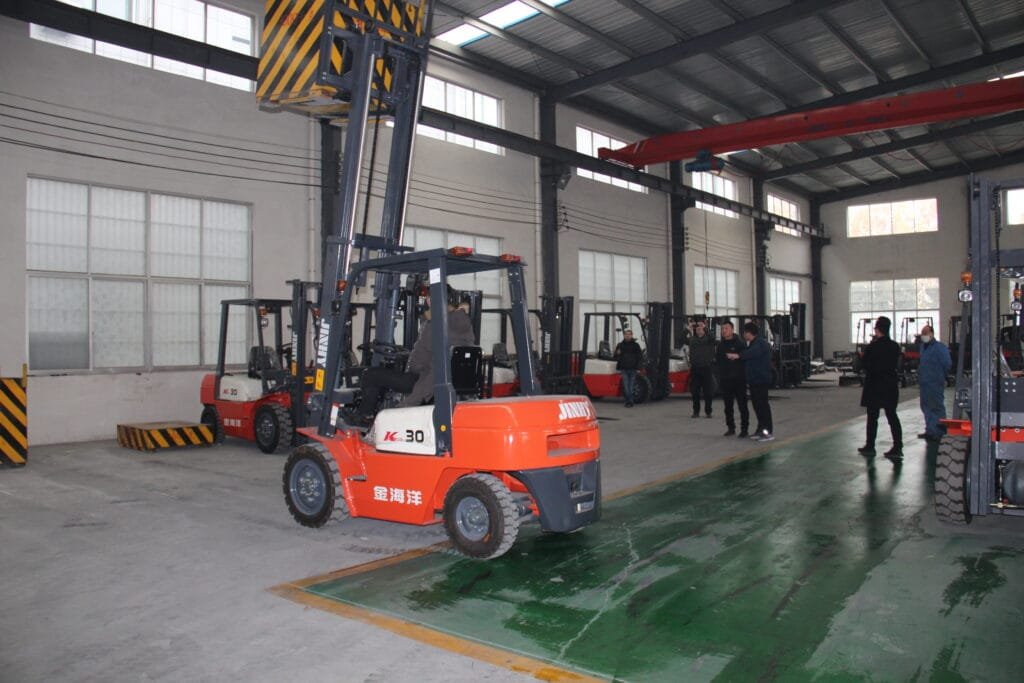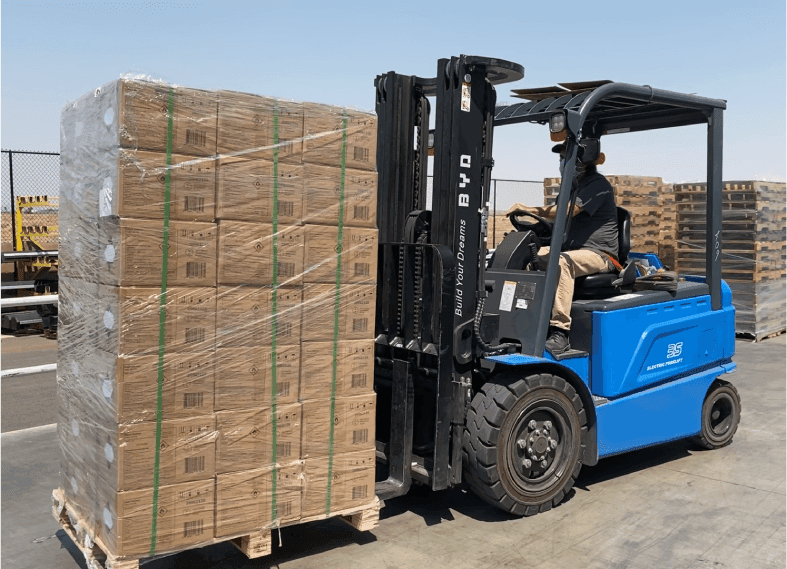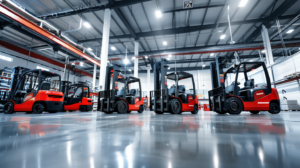Forklifts are crucial machinery in numerous industries, helping to move goods and materials around warehouses, factories, and distribution centers. As demand for forklifts continues to grow, many businesses are turning to China, the world’s manufacturing hub, for purchasing these essential machines. Shipping forklifts from China, however, requires careful planning and understanding of logistics, regulatory requirements, and safety standards. In this article, we will provide a comprehensive guide to shipping forklifts from China, outlining everything from selecting a reliable supplier to ensuring compliance with import regulations.

Introduction to Forklift Shipping from China
In recent years, China has become the go-to source for forklift manufacturers, offering a wide range of options for businesses looking to acquire this essential equipment. While the decision to source forklifts from China can be financially beneficial due to lower production costs, it also comes with its own set of challenges. Understanding the shipping process is vital to avoid complications during transport and ensure timely delivery.
Why Choose China for Forklift Purchases?
The Scale of Forklift Manufacturing in China
China is a global leader in manufacturing forklifts, producing both domestic models and exports to international markets. With several large manufacturers and a well-established supply chain network, Chinese forklifts are often affordable, well-made, and readily available in bulk. The country offers a diverse range of forklift models, from small electric forklifts to heavy-duty internal combustion forklifts, meeting various business needs.
Affordability and Quality
One of the primary reasons companies choose to source forklifts from China is cost efficiency. Chinese manufacturers typically offer competitive pricing due to lower labor and production costs. Additionally, many Chinese forklift manufacturers adhere to international standards, ensuring the equipment meets the required safety and performance specifications.
Steps to Follow for Shipping Forklifts from China
Shipping forklifts from China involves a structured process that requires careful attention to detail. The steps involved include selecting a reliable supplier, negotiating terms, managing documentation, and choosing the right shipping method.
Finding the Right Supplier
The first step in the shipping process is to identify a trustworthy supplier. Given the high number of forklift manufacturers in China, it’s important to perform due diligence. Start by researching manufacturers with a strong reputation, positive reviews, and an established track record of working with international clients. Look for suppliers who are ISO-certified, which guarantees that their products meet international quality standards.
When selecting a supplier, consider the following factors:
- Quality of Forklifts: Ensure the forklifts meet your specific requirements, whether it be load capacity, battery life, or lifting height.
- Shipping Terms: Check if the supplier can handle the logistics or if you need to hire a freight forwarder.
- Lead Time: Verify the production and shipping lead time to avoid delays.
- After-Sales Support: Ensure the supplier offers adequate after-sales support, including warranty and servicing options.

Negotiating Prices and Terms
Once you’ve selected a supplier, it’s time to negotiate the price and shipping terms. Some key aspects to consider during negotiation include:
- Unit Price: Discuss the base price per forklift and inquire about bulk discounts.
- Payment Terms: Negotiate payment terms, such as down payments, letter of credit, or other payment methods.
- Delivery Terms: Agree on Incoterms (International Commercial Terms) like FOB (Free on Board) or CIF (Cost, Insurance, and Freight) to clarify who bears the cost and responsibility for shipping.
- Lead Time and Delivery Date: Make sure to establish clear expectations regarding when the forklifts will be delivered.
Documentation and Compliance
Shipping forklifts from China requires several documents to ensure compliance with both Chinese export regulations and the import regulations of the destination country. Key documents include:
- Commercial Invoice: A detailed invoice that lists the price and specifications of the forklifts.
- Bill of Lading: A shipping document issued by the carrier that serves as proof of ownership.
- Packing List: A document that lists the items being shipped and their packaging details.
- Certificate of Origin: A certificate that proves the forklift was manufactured in China.
- Import Permit: Some countries may require an import permit for heavy machinery.
Understanding Import Duties and Taxes
Importing forklifts from China often involves paying import duties, taxes, and other fees. The amount of duty you will need to pay depends on the destination country’s tariff structure, the value of the forklifts, and their classification under the Harmonized System (HS) code. It’s essential to consult with a customs broker or freight forwarder to understand these costs and factor them into your total shipping expenses.
Choosing the Best Shipping Method
Choosing the right shipping method is crucial when transporting forklifts from China. Given the size and weight of forklifts, sea freight is the most common shipping method for large orders, although air freight may be an option for smaller or urgent shipments.
Sea Freight vs. Air Freight for Forklifts
- Sea Freight: Sea freight is the most economical method for shipping forklifts in large quantities. It involves loading forklifts into containers, typically 20 or 40-foot containers, and shipping them to the destination port. The shipping duration can range from two weeks to a month, depending on the destination.
- Air Freight: Air freight is faster but more expensive. It’s typically used for smaller forklift shipments or when time is of the essence.

Containerization and Packaging for Forklifts
Forklifts are bulky, heavy machinery, which makes packaging and containerization crucial. Ensure the forklifts are properly secured in containers to prevent damage during transit. Typically, forklifts are either loaded into standard containers, or they may be shipped as breakbulk cargo, depending on the size and destination.
The Role of Freight Forwarders in Forklift Shipping
A freight forwarder is a third-party logistics provider that can manage the shipping process from start to finish. Freight forwarders coordinate all aspects of the shipping process, including booking shipping lines, arranging for inland transportation, and handling customs clearance. Working with a reliable freight forwarder ensures that your forklifts are shipped efficiently and that all regulatory requirements are met.
Ensuring Compliance with Safety Standards
Ensuring that your forklifts meet international safety standards is crucial for both legal compliance and operational safety. Depending on the destination country, forklifts may need to meet certain safety certifications before they can be sold or used.
International Forklift Standards
Different countries have their own forklift safety regulations. For example, in the United States, forklifts must meet OSHA (Occupational Safety and Health Administration) standards. Similarly, in Europe, forklifts must comply with the European Union’s EN 1757-1 standards.
Getting Forklifts Certified for Import
To import forklifts into your country, you may need to ensure that the equipment passes safety inspections and certifications. This includes ensuring that the forklifts meet load capacity, safety features, and environmental standards. Certification may involve testing the equipment, providing necessary documentation, and paying certification fees.

Dealing with Delays and Issues During Shipping
Shipping forklifts internationally can sometimes lead to delays due to factors such as customs clearance, port congestion, or bad weather. Here are a few strategies for dealing with shipping delays:
- Work with a Reliable Freight Forwarder: A reputable freight forwarder can help mitigate delays by keeping track of shipments and proactively addressing issues.
- Clear Communication: Ensure constant communication with your supplier and shipping partners to stay updated on the shipment’s status.
- Expect Customs Inspections: When your forklift arrives at the destination port, it may undergo customs inspection. Be prepared for delays during this process, which can take several days.
Cost Considerations in Forklift Shipping
Shipping forklifts involves several costs that must be carefully considered:
- Shipping Charges: Includes freight charges, container fees, and terminal handling charges.
- Insurance: Shipping forklifts over long distances carries risks, so it’s important to purchase insurance to cover potential damages during transit.
- Port Fees: The fees charged by ports for handling and processing your shipment.
- Import Duties and Taxes: As mentioned, duties and taxes are an essential part of the cost structure.
Cost Breakdown for Forklift Shipping
Here is an estimated breakdown of costs involved in shipping forklifts from China:
- Sea Freight: $500 – $2000 per forklift (depending on destination and container size).
- Insurance: 1-2% of the shipment’s total value.
- Port Fees: $200 – $500 per container.
- Import Duties/Taxes: Varies by destination country.
Hidden Costs to Consider
Some hidden costs may not be immediately apparent, such as:
- Storage Fees: If your forklifts arrive and cannot be cleared promptly through customs, you may incur storage fees.
- Inspection Fees: Customs inspections, especially for large machinery, may incur additional charges.

FAQs About Forklift Shipping from China
- How long does it take to ship forklifts from China?
- Shipping usually takes 2-4 weeks by sea freight, depending on the destination.
- What documents do I need to import forklifts?
- You will need a commercial invoice, bill of lading, certificate of origin, packing list, and possibly an import permit.
- Is it safe to ship forklifts by sea?
- Yes, sea freight is safe if proper packaging and handling procedures are followed.
- Do I need a customs broker to import forklifts?
- Yes, a customs broker can help you navigate customs clearance and ensure compliance with import regulations.
- Can I ship forklifts by air?
- Air shipping is possible but very expensive and typically used for smaller shipments or urgent orders.
- Are there any safety standards for forklifts when shipping internationally?
- Yes, forklifts must meet safety and certification standards set by the destination country.
Conclusion
Shipping forklifts from China can be an excellent option for businesses looking for cost-effective solutions to meet their material handling needs. However, the process involves careful planning, selection of the right suppliers, understanding of shipping methods, and adherence to safety and regulatory standards. By following the guidelines outlined in this article, you can streamline your forklift importation process and ensure that your equipment arrives safely and on time.




